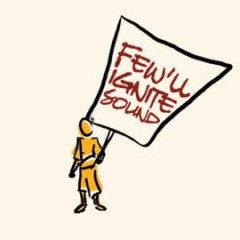Compass Compassion
When I first met Guo Jian, we did a lot of hanging out in the city like going to restaurants and shops or walking around in the interesting areas like Gu Lou 鼓楼 or Hou Hai 后海. He knew the side alleys and fun stores and would regularly tug me around corners that I hadn’t even noticed led to pathways. I felt so lucky to learn the city through him, like I was getting a secret tour of little known and tucked away gems in the inner Beijing arts world.
I realize now that he was showing me his well-worn path. He had been to these places many times over the decade he’d spent in Beijing and had memorized their locations, for the most part. This was his turf and he was introducing me to it.
Nevertheless, we did a lot of retracing our steps.
It went like this: we’d walk into a bookstore. I invariably got bored because my Chinese wasn’t anywhere near the level required to browse books written in the Chinese script, not to mention that English books were often nowhere to be seen. I’d scan the pictures on the covers, look through the blank notebooks, sometimes even sit on the front steps of the shop waiting and people watching, all while he flipped pages and lost track of time. (That was when he could do no wrong and I never felt for a moment that he wasn’t considering my feelings by making me wait. Being blissed out on a new person makes us much more patient, doesn’t it?)
Then, he would eventually emerge with a bag of books under his arm and I’d smile a greeting, joining him again as he adopted a purposeful pace in the opposite direction of the car. I simply figured we were going somewhere else and he had a destination in mind; I never questioned what was happening (in more ways than one!). Besides, asking for clarity was too exhausting for my choppy Chinese, which made me a silent, willing companion.
Then, 100 metres later, he’d stop and freeze, scratch his head, and then grab my arm and reel me back in the other direction, finally realizing that he was walking away from the car rather than towards it.
This is Guo Jian: completely directionless and completely okay with it.
It says a lot about a person that he can be so relaxed about not having an internal compass. His short-term memory is painfully underused, as well. He doesn’t take in the direction he came from, nor the route he drove. He is a slave to a GPS and now quite happily reliant on his wife with her built-in sense of direction.
It used to make me laugh. That is, until I got home from Canada once, tired and really not in the mood for anything that wasn’t shaped like a bed and soft like a pillow. We descended into the enormous parking garage at Beijing airport and he had forgotten where he’d parked the car. We walked around for at least a half an hour before I stopped and refused to move. I had had enough.
We were about two years into our relationship by this point and I got angry with him for not paying attention, for not thinking about what I might need when I arrived (like a quick shuttle to somewhere restful), and then doubly angry at him for not considering the weight of my bags as we shuffled along, nor offering to help me carry them.
He got defensive, of course. He set off on his own to search out the car and I remained glued to my stubborn post, yelling after him my combined “letter-number” location in hopes that it would register in his brain for when he’d have to come and pick me up. He hadn’t taken it in when he turned on his heels, irritated with me for my lack of patience. He didn’t look back. This just made me angrier! Was he going to forget where I was now too? I was fuming as much as the parking garage.
Eventually, he did locate the car and he did locate me, but any joy of reunion had long been squashed. We drove home in mutually irritated silence.
This summer he did some driving in Toronto for the first time while I stayed back with our daughter. One night, he drove around the city for over two hours because he reversed north and south in his mind and then reversed east and west. Everyone he asked spoke English too quickly for his listening comprehension and so he just thanked the friendly people and drove on… in the wrong direction. When he finally made it back to where we were staying, he was frazzled and tired and the car was almost out of gas.
I felt sorry for him then. Compassion resurfaced and I tried to imagine what it would be like to have no sense of even one of the compass points—north, for example, the direction that always rings out most strongly for me. When I’m spun around in a city, I can still sense its pull, especially when I focus my body. I feel it my feet. What is it like not to have that magnetic connection with the ground? Is it jarring? Does it make a person feel lost all the time?
That’s where I’m wrong. He’s quite content to have no sense of direction; he just doesn’t enjoy wasting time because of it.
Now, when we park the car and we’re together, it’s me who knows where we’ve parked it. When I locate a bathroom in a large public space while I’ve left him behind in a restaurant, for example, I know that I may have to escort him there after we’ve eaten and then wait for him so that he can actually get back. I don’t mind. I’ve simply learned to accept that his absentee internal compass is just part of what makes him the “Mr.Bean” that he is.
I also see it with a fuller head now.
Looking back to when we first met, he had no doubts as to our destiny together, our future path, our direction. He could see it clearly in his mind’s eye and never wavered for a moment. I, on the other hand — the one who could get us back from whence we came, who could retrace any steps, and who always knew my way “home” — couldn’t figure out where the path of our love led. I couldn’t see the future and felt so lost when he spoke of it, as though they were roads we’d already travelled that he expected me to remember. Not to mention the fact that my sense of “home” started to blur as soon as we fell in love and I felt all my bearings slowly unglue until I was a spinning mess.
A control of one’s physical direction is one thing; a control of one’s emotional direction is another. He got me there. It was his inner compass that pulled us through all that, which is probably why I no longer mind when he has absolutely no idea where he is in the physical world. Maybe that’s why the word compassion has the word compass in it.
I know his heart is here. He knows his way to this love. His heart is home.
***
Epilogue:
My question is this: is having a sense of direction hereditary? Or is it learned?
After so many years of travelling, I think my skills have been honed. Thus, I argue that maybe it’s as much an inherent skill as it is a learned one; effectively, it’s about paying attention, right? Yet, I’ve seen it happen: my father-in-law often forgets where to turn when it comes to getting back to his own house. And, he’s lived in that town his whole adult life! So, if it IS hereditary, it’s obvious where Guo Jian gets it from.
Will my children lack this basic survival skill? Am I destined to have to tie ropes around the whole family or sew RFD tags into their clothing so that I can track and fetch them? Or, will my children inherit their mom’s good sense of direction?
I suppose it will be several years before I know the answers to those questions. For now, I’ll keep them all on short (figurative) leashes—their father especially! Or, at least make sure his devices with GPS functionality are well-charged and on his person before he leaves my sight!
Would love to hear all your thoughts and theories about this, everyone!








